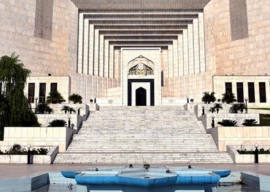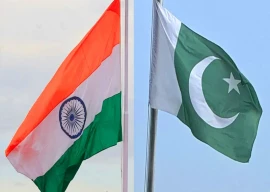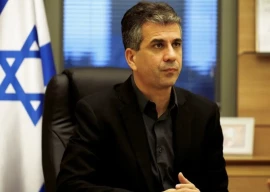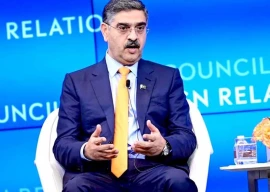
Pakistan's decision to recognise Israel would be determined by its own national interests and those of the Palestinians, according to Caretaker Foreign Minister Jalil Abbas Jilani, who also said on Saturday he didn't meet his Israeli counterpart on the sidelines of UN General Assembly (UNGA) session in New York.
Foreign Minister Jilani was responding to claims by Israeli Foreign Minister Eli Cohen on Friday that six or seven Muslim countries would make peace with the Jewish state if his country’s deal with Saudi Arabia went through.
Speaking to Israel's KAN News immediately after Prime Minister Benjamin Netanyahu's speech at the UNGA, in which he touted a "new Middle East" where Israel and Saudi Arabia enjoyed diplomatic ties, Cohen said that "peace with Saudi Arabia means peace with the greater Muslim world”.
Cohen did not mention any name, except Saudi Arabia, but added, in response to a question, that those countries were located in Africa and Asia. Cohen later said that only some had been directly in touch with him. Foreign Minister Jilani, however, said he did not meet his Israeli counterpart.
Also read: 'Six or seven Muslim countries may normalise relations with Israel'
US President Joe Biden has been pushing for a landmark deal between Saudi Arabia and Israel. Saudi Crown Prince Mohammed Bin Salman told Fox News recently that his country was in talks with Israel, and dismissed reports that process was suspended.
The de facto Saudi ruler said that they were inching closer to a deal with every passing day. However, the crown prince made it clear that any deal with Israel hinged upon Palestinian rights being acknowledged.
Following the US-driven diplomatic initiative in 2020, Israel has drawn closer to the United Arab Emirates, Bahrain, Sudan, and Morocco. However, establishing ties with Saudi Arabia would represent the ultimate goal for the Jewish state and reshape the geopolitics of the Middle East.
Iran, one of Israel’s arch-rivals in the Middle East, sees no chance of success of the US-sponsored efforts for normalisation. Iranian President Ebrahim Raisi said in an interview with CNN on Sunday that US efforts to normalise Israeli ties with Gulf Arab states, including Saudi Arabia, “will see no success”.
The deal, if it goes through, will be a huge victory for Israel and President Biden, who wants to use the development for his re-election next year.
Observers believe that any agreement between Israel and Saudi Arabia, with Riyadh being the primary champion of the Palestinian cause for decades, would put pressure on other countries, including Pakistan, to reconsider their policies.
Islamabad has always resisted pressure to recognise Israel, though in 2005 the then Pakistani and Israeli foreign ministers held a landmark meeting in Turkey. But the process couldn't move forward as there had always been strong opposition to the diplomatic ties with Israel without resolution of the Palestinian issue.
There have been concerns in Pakistan that recognising the Israeli state without permanent solution to the Palestinian conflict would only undermine the country's case on the longstanding issue of Jammu and Kashmir.
However, there are people who feel that Pakistan may adjust to the new realities and form its policy on Israel accordingly. Nevertheless, despite reports of a possible rapprochement between Israel and Saudi Arabia, Pakistan is highly unlikely to change its stance in the near future.


1728091668-0/Princess-D-(1)1728091668-0-165x106.webp)





1723104747-0/PIA123-(1)1723104747-0-270x192.webp)





1695400150-0/image-800x600-(3)1695400150-0-270x192.webp)







COMMENTS
Comments are moderated and generally will be posted if they are on-topic and not abusive.
For more information, please see our Comments FAQ